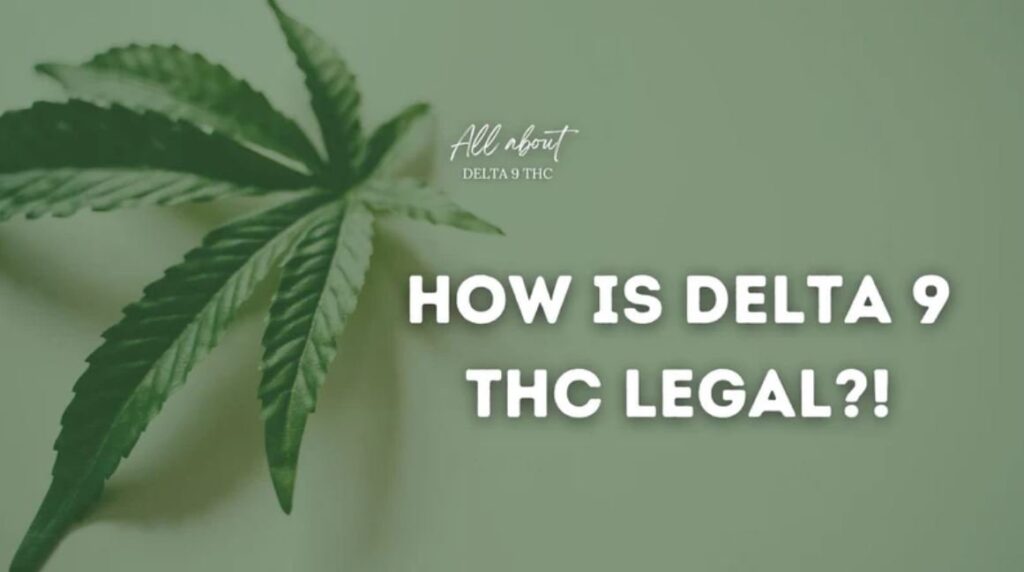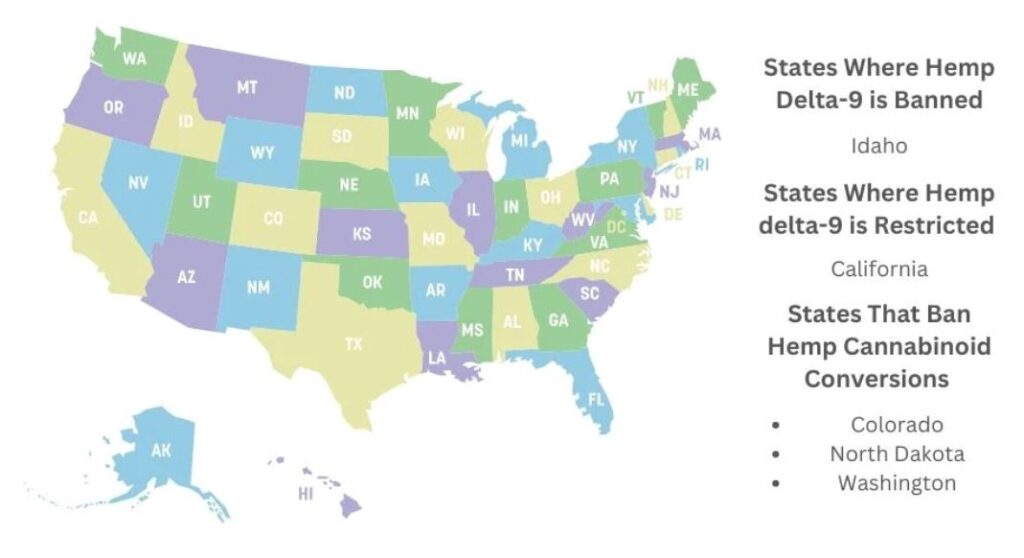Delta 9 THC, often known as Delta 9-tetrahydrocannabinol, is a popular cannabinoid renowned for its intoxicating properties. It’s the chemical in cannabis that makes you “high.” However, despite its bad image, Delta 9 plays a crucial part in cannabis’ medicinal potential. In this article, we will talk about the legality status of Delta-9 and how old do you need to be to buy Delta-9!
To buy Delta-9 THC products, you generally need to be 21, aligning with alcohol purchase age requirements. However, some states allow 18-year-olds to buy medical cannabis with a prescription. Check local laws for specifics.

Delta 9’s legal status is a little unclear. While it is legally permitted under the 2018 Farm Bill, it only applies to hemp-derived goods with Delta 9 concentrations less than 0.3%. Anything exceeding this threshold is still deemed marijuana and is therefore federally banned.
Laws can differ widely across states. Some states, including Delta 9, have fully legalized cannabis, but others have stronger regulations. Always check your local regulations before purchasing any cannabis product.
Age requirements are often similar to those for alcohol. To acquire Delta 9 THC-containing goods, most states demand that you be at least 21 years old. However, several states allow anyone over the age of 18 to purchase medical cannabis with a legitimate prescription. Again, local regulations define these specifics, so double-check this information based on your region.
Navigating the world of cannabis, particularly compounds like Delta 9 THC, necessitates a delicate mix of knowledge and obedience to restrictions. As we go more into this subject, remember that being an informed consumer is essential for safe and responsible use.
How Does Delta 9 Differ From Delta 8?
While Delta 9 THC may be the star of the show, it is not the only one on stage. Meet Delta 8 THC, a lesser-known yet equally intriguing cannabinoid. Although the names are identical, Delta 9 and Delta 8 differ significantly in terms of legality, manufacturing technique, and effects on CB1 and CB2 cannabinoid receptors.
Starting with legality, both Delta 9 and Delta 8 are subject to the provisions of the 2018 Farm Bill, which authorized hemp-derived products with a THC concentration of less than 0.3%. However, because the majority of Delta 8 is synthesized from CBD in a lab, it falls into a legal gray area when contrasted to Delta 9, its naturally occurring cousin.
In terms of manufacture, Delta 9 occurs naturally in cannabis plants, but Delta 8 is often produced in a laboratory through certain chemical reactions. CBD, another cannabinoid, undergoes isomerization to become Delta 8 THC.
Now let’s look at how these two cannabinoids interact with your body. Delta 9 and Delta 8 connect to CB1 and CB2 cannabinoid receptors in your body’s endocannabinoid system. However, they do so in distinct ways. Delta 9 has a higher affinity for the CB1 receptor, which is found largely in the brain, resulting in stronger psychoactive effects. Delta 8 binds more softly to these receptors, producing gentler effects that users frequently report as more clear-headed and soothing.
Understanding these distinctions will allow you to make an informed decision about which sort of THC product is best suited to your needs. Just keep in mind that whether you’re thinking about buying a Delta 9 or Delta 8 product, you should always check the legal status in your state first.
Why Does State Regulation Matter When Purchasing Delta 9 Products?

Some of you may be thinking, “If the 2018 Farm Bill federally legalized Delta 9 and other hemp-derived products with less than 0.3% THC, why should I worry about state regulations?” Here’s the deal: while federal rules give a fundamental framework, Delta 9 THC restrictions differ by state.
Some states closely follow the federal script, permitting the sale and usage of Delta 9 THC as long as it meets the Farm Bill’s requirements. Other states, however, have tougher regulations or even decriminalization rules that differ from federal guidelines.
For example, some states may have tougher age limitations for obtaining Delta 9, whilst others may limit the types of goods available – oils and tinctures may be available but not edibles or vapes. Then there are states that have completely decriminalized cannabis, which means they have eliminated criminal sanctions for possessing tiny amounts.
What’s the bottom line? When it comes to Delta 9 THC, state restrictions dictate what you can buy, where you can buy it, and who can buy it. That is why, before purchasing any Delta 9 product, make sure you are aware with your local legislation. Understanding these regulations will help you make legal and safe choices on your wellness path.
What Is The Legality Of Delta-9 THC In Each State?
| State | Legal Status of Hemp Delta-9 THC |
|---|---|
| Alabama | Legal |
| Alaska | Legal with specific THC content limits |
| Arizona | Legal |
| Arkansas | Legal |
| California | Legal but with severe restrictions |
| Colorado | Legal but banned in case of chemical conversion |
| Connecticut | Legal with total THC content limits |
| Delaware | Legal with total THC content limits |
| Florida | Legal |
| Georgia | Legal with product limitations |
| Hawaii | Legal with certain product bans |
| Idaho | Illegal |
| Illinois | Legal |
| Indiana | Legal |
| Iowa | Legal with exceptions for legal hemp products |
| Kansas | Legal with specific conditions |
| Kentucky | Legal |
| Louisiana | Legal |
| Maine | Legal |
| Maryland | Legal |
| Massachusetts | Legal |
| Michigan | Legal with total THC content limits |
| Minnesota | Legal |
| Mississippi | Legal with specific CBD to THC ratio limits |
| Missouri | Legal |
| Montana | Legal |
| Nebraska | Legal |
| Nevada | Legal with total THC content limits |
| New Hampshire | Legal |
| New Jersey | Legal |
| New Mexico | Legal |
| New York | Legal |
| North Carolina | Legal |
| North Dakota | Legal but with significant restrictions |
| Ohio | Legal |
| Oklahoma | Legal |
| Oregon | Legal with regulations for psychoactive products |
| Pennsylvania | Legal but pending future restrictions |
| Rhode Island | Legal with restrictions on other THC isomers |
| South Carolina | Legal with potency limits |
| South Dakota | Legal with total THC content limits |
| Tennessee | Legal |
| Texas | Legal for adults over 21 |
| Utah | Legal |
| Vermont | Legal but with potential restrictions against synthetic cannabinoids |
| Virginia | Legal |
| Washington | Legal but with conversion ban likely to impact availability |
| West Virginia | Legal |
| Wisconsin | Legal |
| Wyoming | Legal |
How Can Consumers Safely Purchase and Consume Delta-9 Products?

So, you’ve researched the legality of Delta 9 THC in your state. You are now prepared to put it to the test. But how can you know you’re making a secure purchase? Here are a few key items to consider.
First and foremost, ensure that the product complies with local legislation. Remember, as a consumer, you are responsible for ensuring that what you are purchasing is legal in your jurisdiction. One method is to check if the product has a Certificate of Analysis (COA) from a recognized laboratory. This document will confirm that the product’s THC content satisfies federal and local rules.
Second, take note of the THC potency. While federal requirements require Delta 9 goods derived from hemp to contain less than 0.3% THC, the actual amount varies by product. Before making a purchase, ensure that you are comfortable with the THC level.
Another important consideration is if the product is derived from hemp or marijuana. Although these plants are both members of the cannabis family, their cannabinoid concentration varies. Hemp-derived products are typically low in THC, but marijuana-derived products may have higher quantities of THC. Again, studying the COA can provide useful insights.
Remember, however, that navigating this vast amount of information should not be done alone. Consulting with healthcare professionals before use is a wise decision. They can give you advice based on your medical history and explain any potential interactions with other medications.
Also Read | What Are the Health Benefits of CBD?
What are the potential risks and benefits of using full-spectrum CBD products containing Delta 9?
Now that we’ve covered how to properly buy and consume Delta 9, let’s look at the potential hazards and advantages of consuming full spectrum CBD products containing this cannabinoid.
First, let’s address the elephant in the room: one of the primary concerns connected with utilizing full spectrum CBD products containing Delta 9 is the possibility of a positive drug test. Many organizations and major sports leagues have tight restrictions about THC intake. Even if the level of Delta 9 THC in these products is under legal limits, it may still be detected on a drug test. If you are subject to regular drug screenings, you should be aware of this danger.
Another concern to consider is the possibility of legal complications while traveling with Delta 9. Cannabis laws vary greatly over the world, including between states in the United States. If you carry full spectrum CBD products containing Delta 9, you may face legal consequences if you enter a jurisdiction where these products are outlawed. Check local laws before traveling with any cannabis product.
But let us not forget about the positives! One of the primary benefits of full spectrum CBD products is that they contain a wide range of cannabinoids, not only CBD. This implies they could provide what is known as a “entourage effect,” in which the various components collaborate to boost one other’s benefits.
One of these advantages is responsible THC use. When taken properly, THC can provide therapeutic benefits such as pain reduction, mood enhancement, and improved hunger. Remember, it’s all about balance and moderation.
To Wrap It Up
Navigating the complicated world of Delta 9 THC might be difficult, but it is a journey worth doing. We’ve covered a lot of territory today, including knowing what Delta 9 is, its legal position under the 2018 Farm Bill, and the normal age limit for purchasing it. We’ve also seen how Delta 9 varies from other THC variations, such as Delta 8, and the critical role that CB1 and CB2 cannabinoid receptors play in this dynamic.
But the learning does not end there. In our quest to make informed decisions on Delta 9 products, we’ve looked at why state rules matter and how they differ from federal guidelines. We focused on states with stronger restraints as well as those with decriminalization policies.
During our discussion on properly acquiring and ingesting Delta-9 goods, we emphasized topics such as verifying product compliance with local laws, assessing THC potency, and determining whether a product is hemp or marijuana-derived. Let’s not forget our in-depth look at the potential hazards and advantages of taking full spectrum CBD products containing Delta 9.
Weighing potential hazards, such as positive drug tests and legal concerns while traveling, against benefits, such as responsible THC intake, can assist you in making an informed decision about whether these items are good for you.
Remember, the key to successfully navigating this landscape is to be knowledgeable about local restrictions and to buy from trusted sources. Before using any product, always consult with a healthcare practitioner. Your health journey is unique, and it’s critical to personalize it to your specific requirements.

Leave a Reply